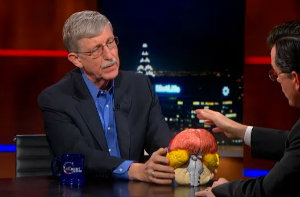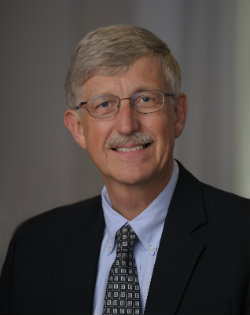 Watch Dr. Francis Collins' recent appearance on The Colbert Report.
Watch Dr. Francis Collins' recent appearance on The Colbert Report.At the John A. Hartford Foundation, our commitment to improving the health of older Americans builds on a long and rich 84-year history in health care and biomedical research with many significant accomplishments.
We have mentioned some milestones in passing (e.g., dialysis and kidney transplantation) and many more are described in the Foundation’s history through the 1980s, The Greatest Good. (You can download PDFs of the Introduction and Chapter One.)
If you listen to National Public Radio (NPR) starting Monday, April 15, you may hear the Hartford Foundation acknowledged on-air during programming. We hope that this sponsorship and acknowledgement will increase public awareness of the Foundation and its mission, and improve our ability to support our grantees in their work. I’ll have more to say about our partnership with NPR on Health AGEnda next week.
However, the other day I was looking through our 1986 annual report (pre internet—sorry, no link) reviewing a long-since-closed program, “The John and George Hartford Fellows,” (addressing the still-current generic issue of early career support for physicians to pursue biomedical research) and a name popped out at me.
In the last years of this program (1979-86) a new physician faculty member at the University of Michigan received an award for his project "Directional Cloning of DNA Fragments at a Large Distance From an Initial Probe—‘Chromosome Hopping' and its Applications." This young faculty member was Francis S. Collins, MD, PhD.
 Dr. Collins would later lead the human genome project and become head of the National Institutes of Health (NIH). As NIH director, he is now leading the new Brain Research through Advancing Innovative Neurotechnologies (BRAIN) Initiative announced by President Obama earlier this month.
Dr. Collins would later lead the human genome project and become head of the National Institutes of Health (NIH). As NIH director, he is now leading the new Brain Research through Advancing Innovative Neurotechnologies (BRAIN) Initiative announced by President Obama earlier this month.
In the Aging and Health Program, we have used this same kind of early career support mechanism across a wide variety of fields and disciplines and we already have seen some astonishing contributions to the cause. We are now in the process of shifting our work from developing new scholars toward a focus on things that our precious cadre of geriatric care experts can do to improve health care, right now.
But we also know that there will still be many important advances in research and academic fields that our grantees will achieve and we will still be proud. We expect more great things.
It is pretty fabulous to see that the Foundation played a role, however small, in Dr. Collins’ career trajectory. Although we certainly can’t take credit for his quick wit and self-confidence in going toe-to-toe with Stephen Colbert on Comedy Central’s Colbert Report.
So rest assured that if any of our Aging and Health grantees ever become director of the NIH (or even an Institute), we will be very proud of you, too.
